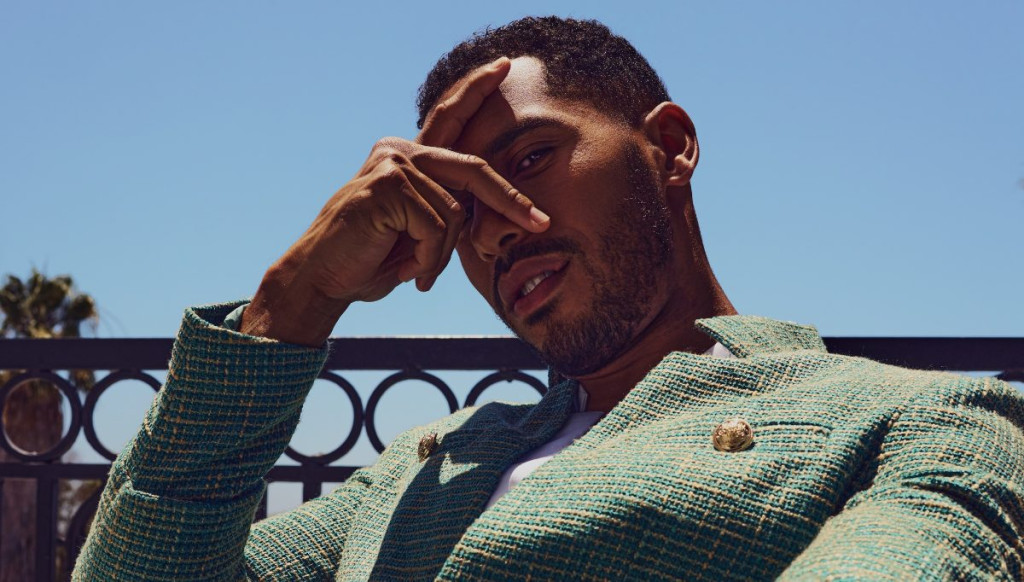Elliot Knight is redefining what it means to be an actor in Hollywood—carving out space for queerness, introspection, joy, and quiet power to exist at the center of the narrative. For him, acting isn’t about fitting into a mold; it’s about expanding the frame entirely.
Born in Birmingham, England, Knight got his start in the UK, leading the British TV series Sinbad (2012) fresh out of drama school. But it wasn’t until he moved to the U.S. that his career, and his voice, found a different kind of volume.
His credits include Once Upon a Time, where he reimagined Merlin, and How to Get Away with Murder, playing the fiancé of Michaela Pratt (Aja Naomi King) in Shondaland’s twisted legal world.
But many may recognize Knight from his breakout role as Colin in The Boys—the tender, rebellious love interest of Frenchie in one of the show’s most emotionally vulnerable arcs. The role broke ground for queer intimacy in a show known for its brutal satire and explosive violence.
Now, Knight brings his talents to his latest project, Countdown, Prime Video’s pulse-pounding new drama that premiered with three episodes on Wednesday, June 25, exclusively on Prime Video.
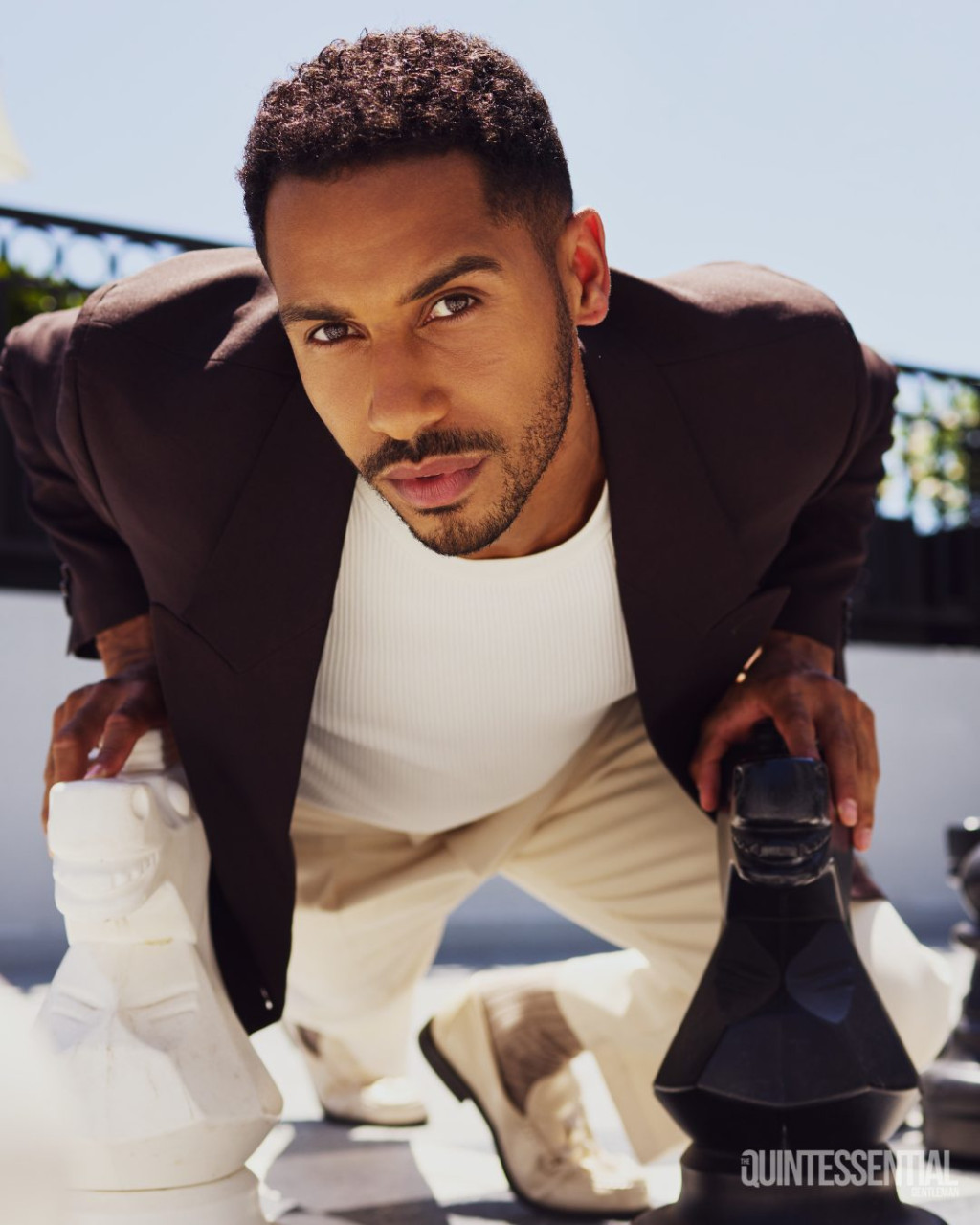
Suit and Shirts: H&M Runway | Pants: Maniere
In the series, he plays Keyonte Bell, a sharp, third-generation FBI agent with aspirations to become the bureau’s first Black director. The show follows a specialized task force tasked with stopping a series of deadly domestic terror attacks.
As a mixed-race, queer man navigating two continents and an industry still catching up to authentic representation, Knight refuses to compartmentalize who he is to fit anyone else’s comfort.
He’s spoken openly about growing up without a clear mirror for his identity, and what it means to now be that mirror for others, particularly for Black queer boys who’ve never seen themselves in powerful, loving, complex characters on screen.
Knight isn’t chasing visibility. He’s standing in it with purpose.
His role as the first non-white playable lead in the Call of Duty gaming franchise was more than a casting decision; it was a cultural shift. And while that character isn’t explicitly queer, Knight’s presence in that space matters.
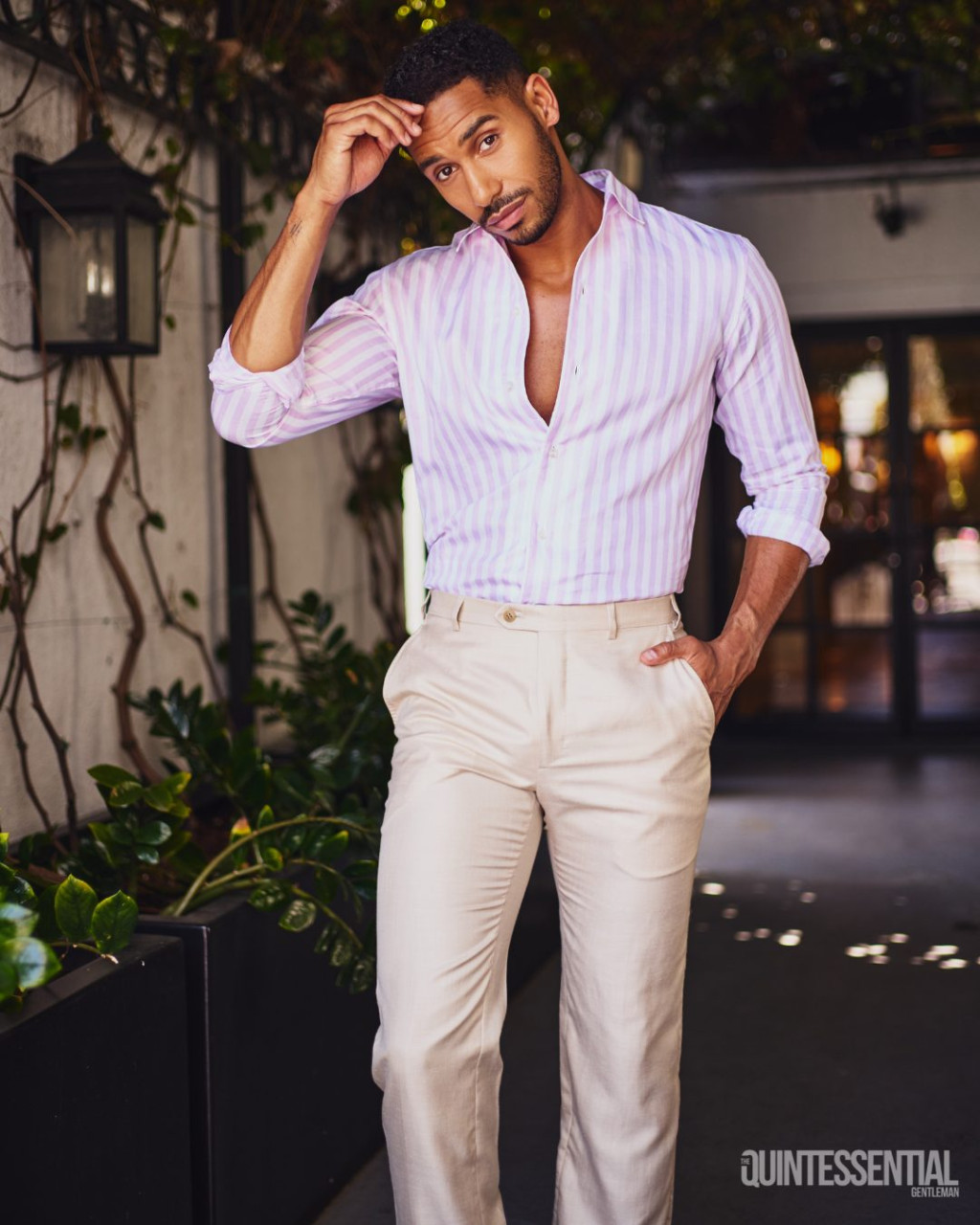
Outfit: Brioni | Shoes: Christian Louboutin
He’s showing up in genres and franchises where Black and queer bodies have long been erased or sidelined. And his mission: to tell the truth, to challenge the status quo, and to protect the joy that comes with fully living out loud.
As Pride Month comes to a close, there couldn’t be a more fitting cover star. Knight represents the intersections of our most urgent conversations about race, sexuality, masculinity, and mental freedom.
But more than that, he embodies possibility. In a culture that too often asks Black men to choose between strength and softness, between queerness and success in Hollywood, Elliot Knight is choosing both.
In this exclusive interview, Knight opens up about the joy and pressure of representation, how he’s building a legacy that makes space for others to do the same, and his new role on Countdown.
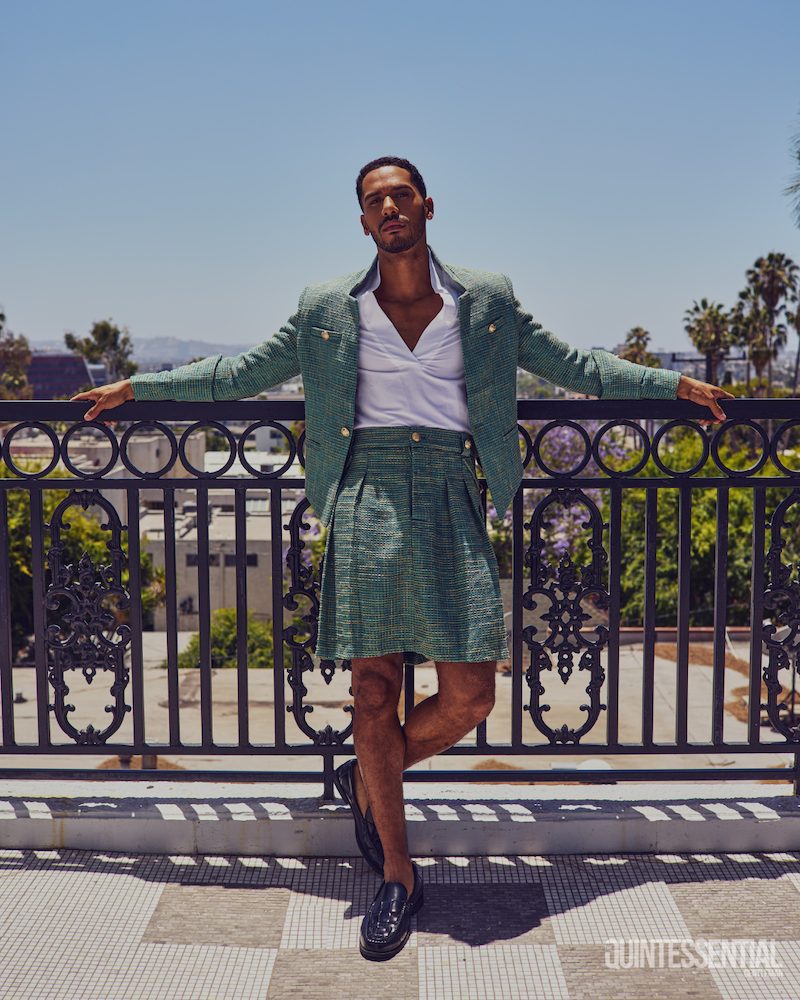
Outfit: ORTTU | Shoes: H&M
This interview has been edited for length and clarity.
QG: You got your start in the UK—what were those early experiences like, and how did they shape your approach to acting?
Knight: I started out in the UK as an actor. I went to drama school, did plays in school. I was always focused on finding what felt true to my identity, not what was reflected around me as what I should be doing, not what I should fit into. A lot of what I saw around me, I didn’t feel like I related to or fit into. And it gave me a lot of the tools I needed to move forward.
My first job in the UK, I was leading a show. I didn’t know how to do it right, I just loved it. I was living out the fantasy. And the experience of doing that, compared to the experience of watching that back and hearing the critical voices, and understanding that this is a job, not just a playground. That was the most informative experience in the UK, for me, was realizing I get to do what I love to do. That’s a gift.
QG: What was the biggest difference you noticed between the UK and the US entertainment industry?
Knight: I’d say the U.S. is obviously a lot bigger. The scope of what we’re trying to achieve and reach for is generally bigger. The U.K., I love. It’s my roots and original home. But in the U.S., and LA specifically, there’s an encouragement to follow your own path. No one’s trying to set ceilings on your expectations. In the U.K., I felt a kind of shyness—to not dare too much, to not reach too much, to not expect too much. That never really sat right with me.
I didn’t want to put a ceiling on my dreams or be told I shouldn’t be dreaming. What are we doing living if we’re not allowed to dream? So, when I moved to the U.S., that’s something I found. Everyone is so motivated to go after what they want, and everyone gives themselves the gift of believing that they can do it. It doesn’t matter if it happens or not. It doesn’t matter if it goes the way that they planned or expected, or they were told it needs to. They just let themselves chase and be in pursuit and be in motion.
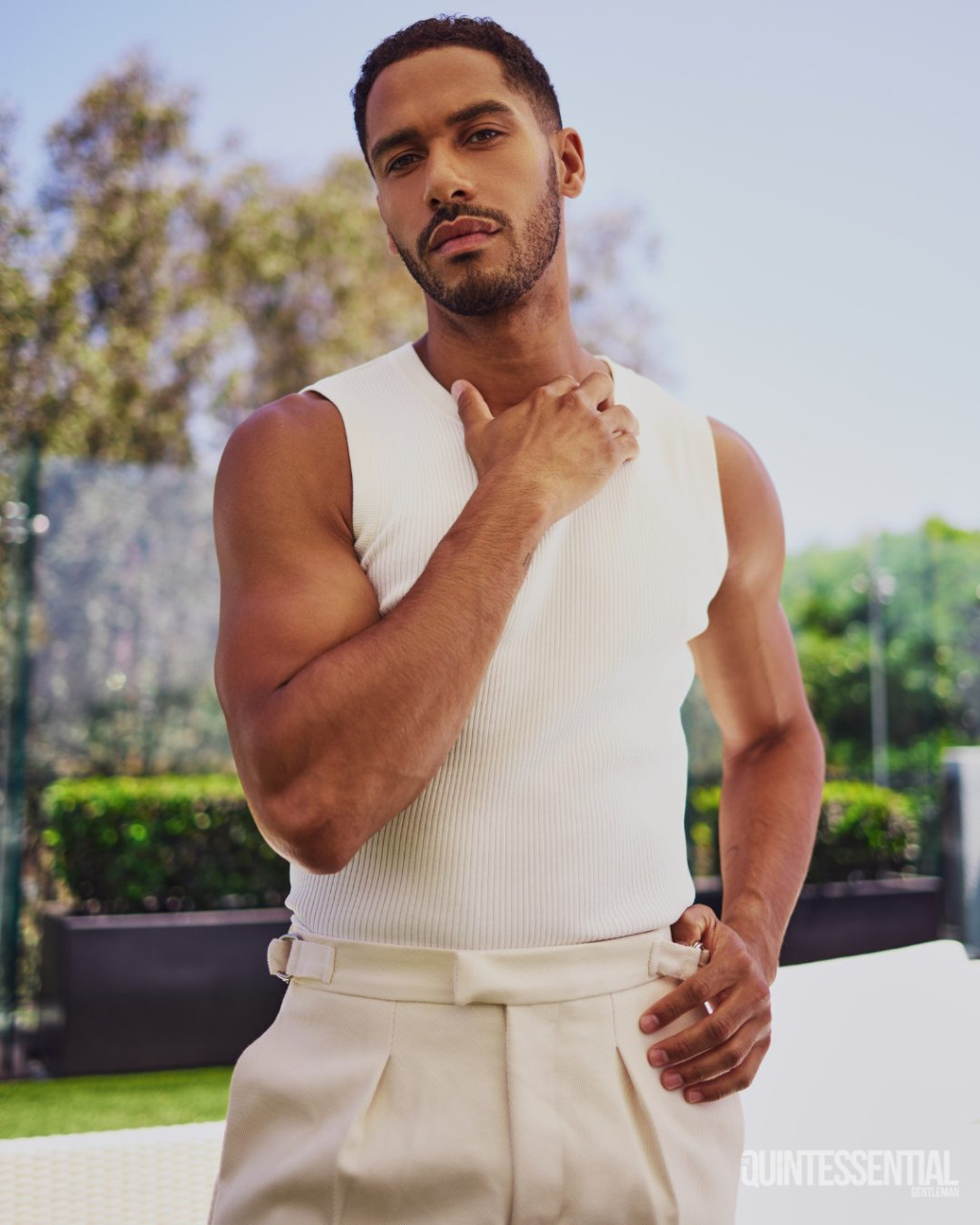
QG: As a Black British actor working in the U.S., do you feel a responsibility to bridge cultural perspectives?
Knight: When I’m thinking about identity, about racial identity, about sexual identity, being queer, finding my own confident spot in the truth of all of those things, it’s a daily practice. A daily reflection. What drives my creative pursuits was, at first, trying to find a home for my truth that felt so different from everything around me. At some point, it went from finding a home to creating a home. Instead of asking for acceptance, I have to find and create my own acceptance and then welcome people into my understanding of myself.
I’m mixed race—Black, white, English, Jamaican—born and raised in the UK, and moved to the US. Black identity here is powerful and important, but it’s so different from how I grew up and how I understand myself. It’s been a challenge not to fall into the trap of viewing myself through the lens of Hollywood. That can create a very narrow box if you feel like your identity should only be expressed through TV and film, it’s just not big enough.
The pursuit of this industry should be to widen the scope and broaden the spotlight. That’s what I want to contribute to in my own small way. To know your reality is valid and deserves space to be seen is important. Focus on that, carry your own torch—that’s what I’m trying to do, and hopefully that impacts someone else.
There’s always a lot of conversation around Brits coming to America and playing American roles, and I get it. There should be conversation. This is a competitive industry with no guarantees. So much of the choices people make are about their perceptions.
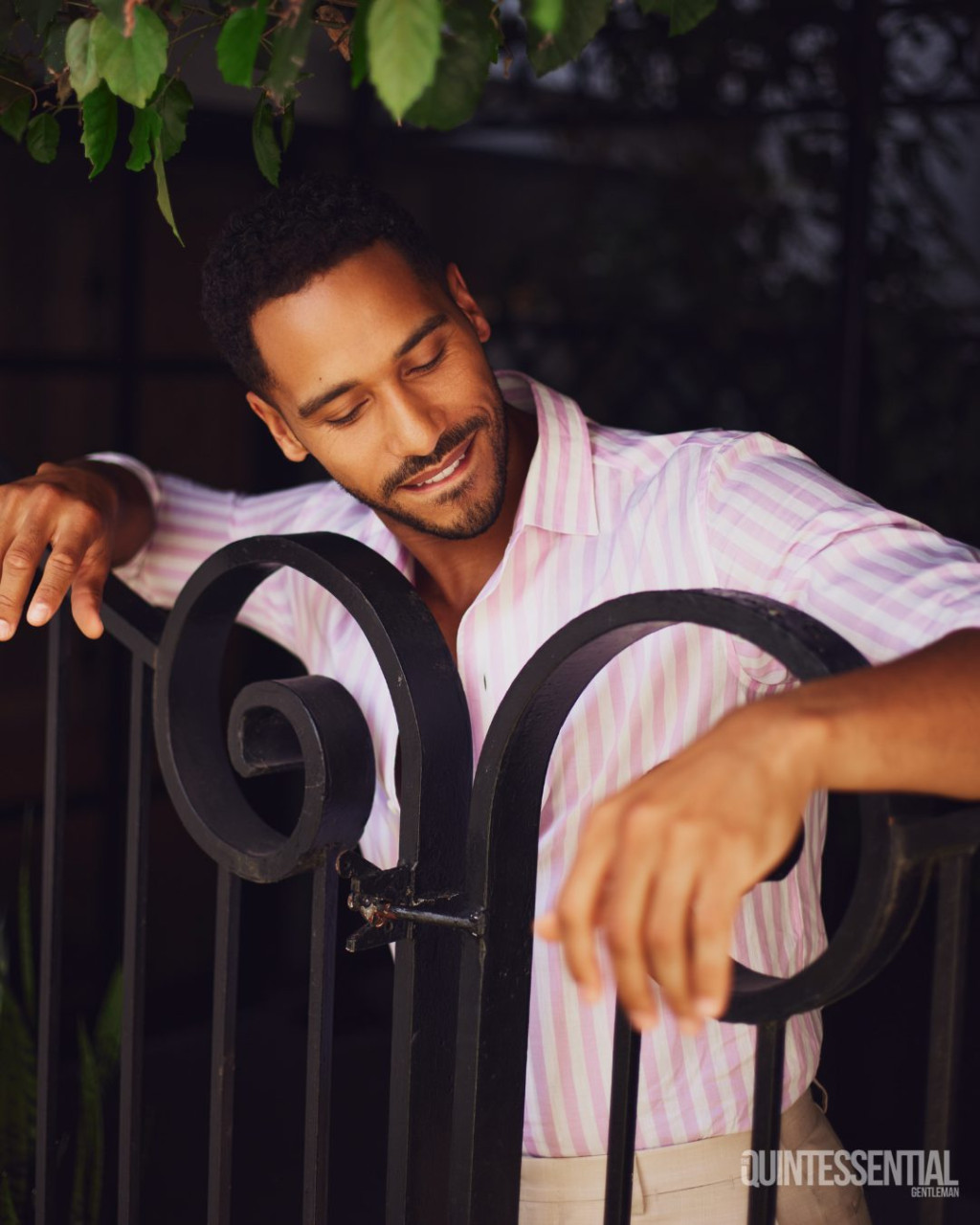
QG: How is navigating Navigating Hollywood as a queer Black British actor?
Knight: Being an actor in Hollywood—being queer, being Black—is not easy for anyone. There’s no path laid before you that offers safety or any guarantee of things going the way you want. What I’ve learned so far is: if you care about the work, if you care about the creative purpose, the best thing you can honor is your truth.
Whether the story reflects your identity or not, you’re not going anywhere if you don’t know where you’re working from, not just knowing it, but accepting it. That’s a real challenge for people: feeling like there’s a place for you where you’re welcome, where you exist, and feel free.
If you don’t have freedom in your work, you can’t play. And if you can’t play, you won’t shine. I’ve had many experiences where I felt stiff, afraid, nervous, or not welcome. And unfortunately, the one who suffers in the end is you, not the people around you who are automatically afforded the gift of comfort.
QG: Do you feel like the industry is finally moving beyond tokenism when it comes to queer characters?
Knight: I feel like the industry is moving beyond tokenism for queer characters. The industry is always moving; that’s the important starting ground. But there is no endpoint with something like this. There’s no full quota of representation that feels organic or natural. That’s not a tangible thing you can grab or achieve. The goal is the motion. As long as we keep it in our minds and inform our actions, we’re doing the right thing.
Is the industry where I and many other queer people would like it to be? No, of course not. There’s also a risk of over-saturating something just to make a point, packing it with every queer theme possible. And it can end up becoming cliché or even borderline offensive. I don’t often see myself in a lot of queer representation and storytelling in L.A. or Hollywood.
If you’re focusing on queerness first, that’s already a mistake. You have to start with humanity. A person being a person. Otherwise, you’re already filtering the story through something that makes it less true.
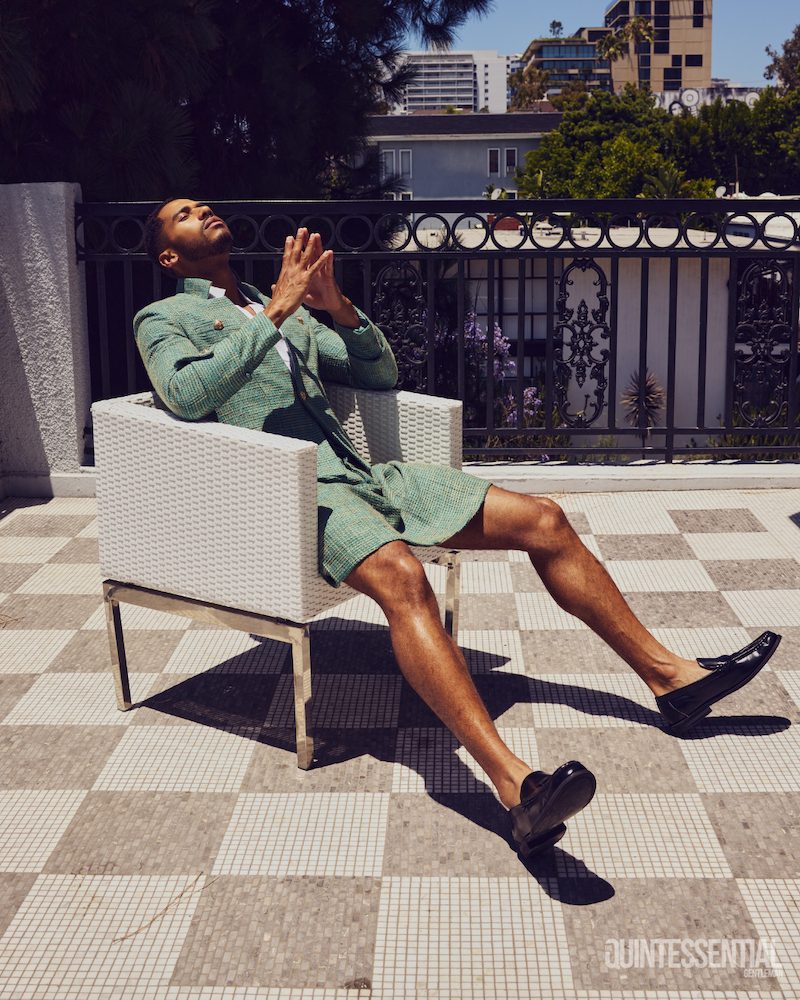
QG: Talk to us about your character on the new series, Countdown.
Knight: I play Keyonte Bell. He is a third-generation federal agent with the FBI; his grandfather was one, his father was one. I see him as a very dedicated, very capable, very driven young Black man who wants to prove himself. And perhaps he’s still on a journey of accepting himself, too. Ultimately, he wants to become the first Black director of the FBI, which—yes, please.
There’s an element of preparing for this role in Countdown that was focused on the job at hand, being an agent, being physically in shape, and skilled enough and aware enough to qualify for what this role would entail in a non-fictional sense, which I always love and enjoy.
I love physical roles and getting stuck into action, and that’s been so amazing about this opportunity. There’s also an element of preparing for any role when I’m in the U.S. that feels quite delicate, approaching the identity aspect and the representation of that.
I’m so grateful to be a Black person and character in such an amazing show and on an amazing platform, where the potential to be seen and heard, and felt is huge. At the same time, it can bring this element of worry, that I’m doing it right. I talk about this with a couple of my castmates, too. It’s important to remember there are many ideas that are all true about how we can represent a character, their culture, and their identity.
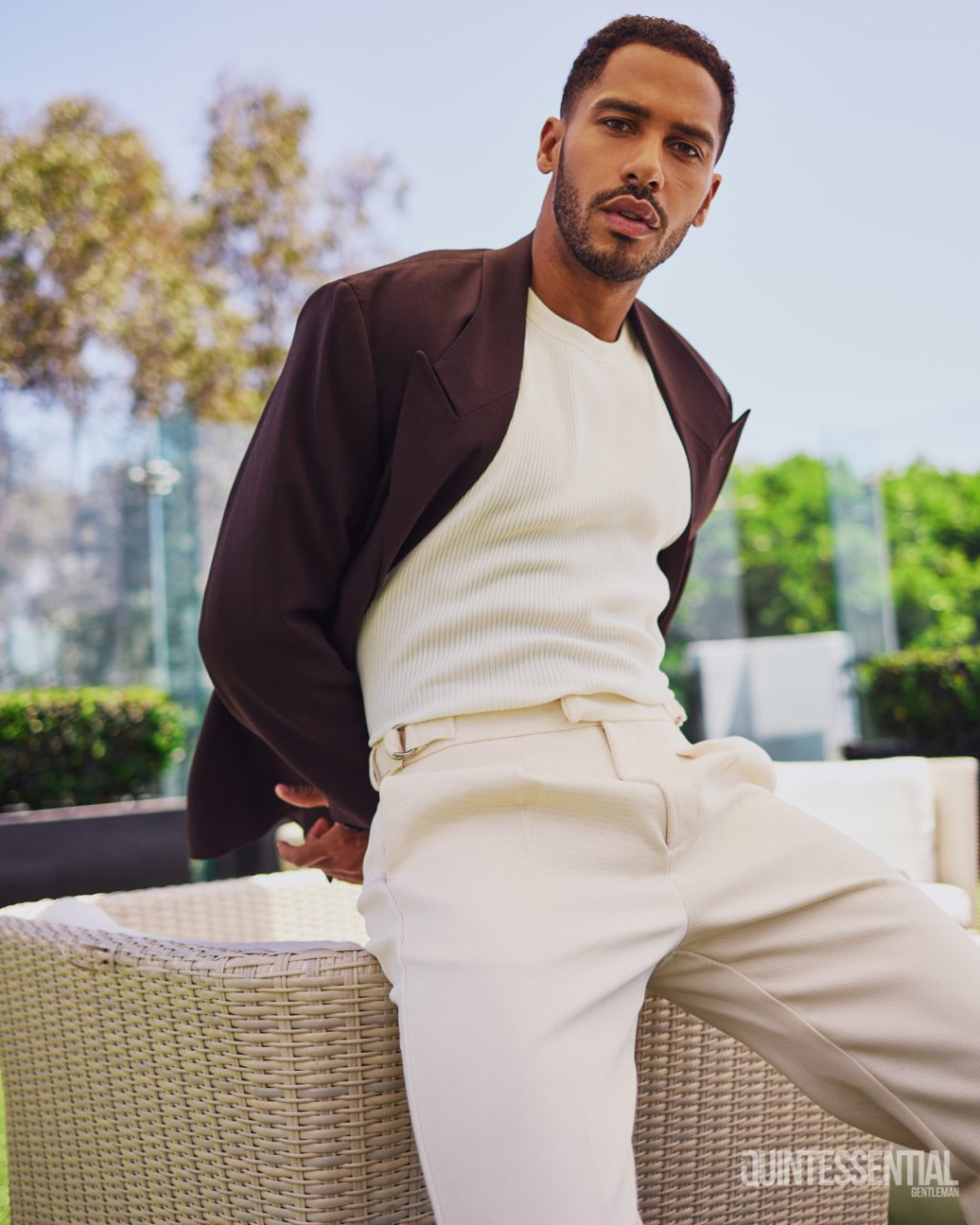
QG: What’s it like on set working with your castmates?
Elliot: I’ll put it this way: to feel at home, welcomed, accepted, relaxed, those are such important ingredients to getting the best output you can. And it’s been true for all of us. We’ve entered this experience with full gratitude.
It’s a gift to be working at the best of times, and the industry lately has not been the best of times for anyone, actors included. So, a room full of people who are so good at what they do, so happy to be there, and want to support each other, that’s the ultimate recipe. It’s been incredible on this job.
I remember chatting to Jensen [Ackles] on set, talking about why this role meant so much to me, representation, my goals, what I want to prove to myself, and he received it with such a full, open heart and so much encouragement. From that day, I knew he understood what I’m doing here, beyond just being on a TV show. He understood my purpose. And he supported that. Multiple cast members have. We’re doing that for each other. It’s a dream. I think we’d all do this for a while if we’re allowed to.
QG: Let’s talk about Call of Duty. You made history there. What did that role mean to you?
Elliot: Being a part of Call of Duty was huge for me. It wasn’t necessarily a goal I had, because it wasn’t something I expected of myself. But your journey can surprise you, you’re not in control of it as much as you’d like to think. I love being part of that world. It’s a huge stage, one I think Hollywood is still catching up to. The gaming industry is reaching so many more people on a daily basis, and the potential to tell powerful, meaningful stories through that platform is huge.
When I joined Call of Duty as a lead, I realized there had never been a hero in that position who wasn’t a white man. I thought, okay, great—we have something important to do here. This isn’t about me, it’s about the moment. People around the world can now see themselves as the hero, someone who looks like them, sounds like them. That’s powerful.

QG: Voice acting requires a different kind of emotional storytelling. What’s your approach to voice acting?
Elliot: Working in Call of Duty and games like that has really helped me understand the power of voice and respect the talent in the game industry, especially in animation. There are such talented performers who bring characters to life using only their voice.
In TV and film, there’s less focus on the vocal aspect, it’s a more visual medium. That can be a trap too, focusing too much on how things look. Voice work is very technical and requires a lot of skill. You can’t just walk into a game or voice project and automatically know how to do it right.
I’m certainly not the most skilled at it, but it’s amazing to be around people who are. I appreciate people focusing on it more. There’s a huge wealth of talent there, and I’d love to see those performers rise and share their expertise.
QG: What advice would you give to Black and queer actors trying to break into the industry?
Elliot: Finding out your truth, loving your truth, and empowering your truth are three really important things if you’re focused on the most valuable output from your work as an actor. Also, love yourself and believe in yourself. There’s something to be said for acknowledging that you exist in your own identity, 100%.
There can be a weight attached to the label of being different that isn’t helpful. And I just don’t have time for that shit anymore, to be honest. I carried that for so long, worried about not fitting in. But how are you going to stand out and fit in at the same time?
Whatever’s true for you, let that guide you. That’s where your joy is. Follow your joy. Follow your freedom. Give yourself space to play. Don’t worry about what other people are doing or when it’s happening. Just stay connected to you.
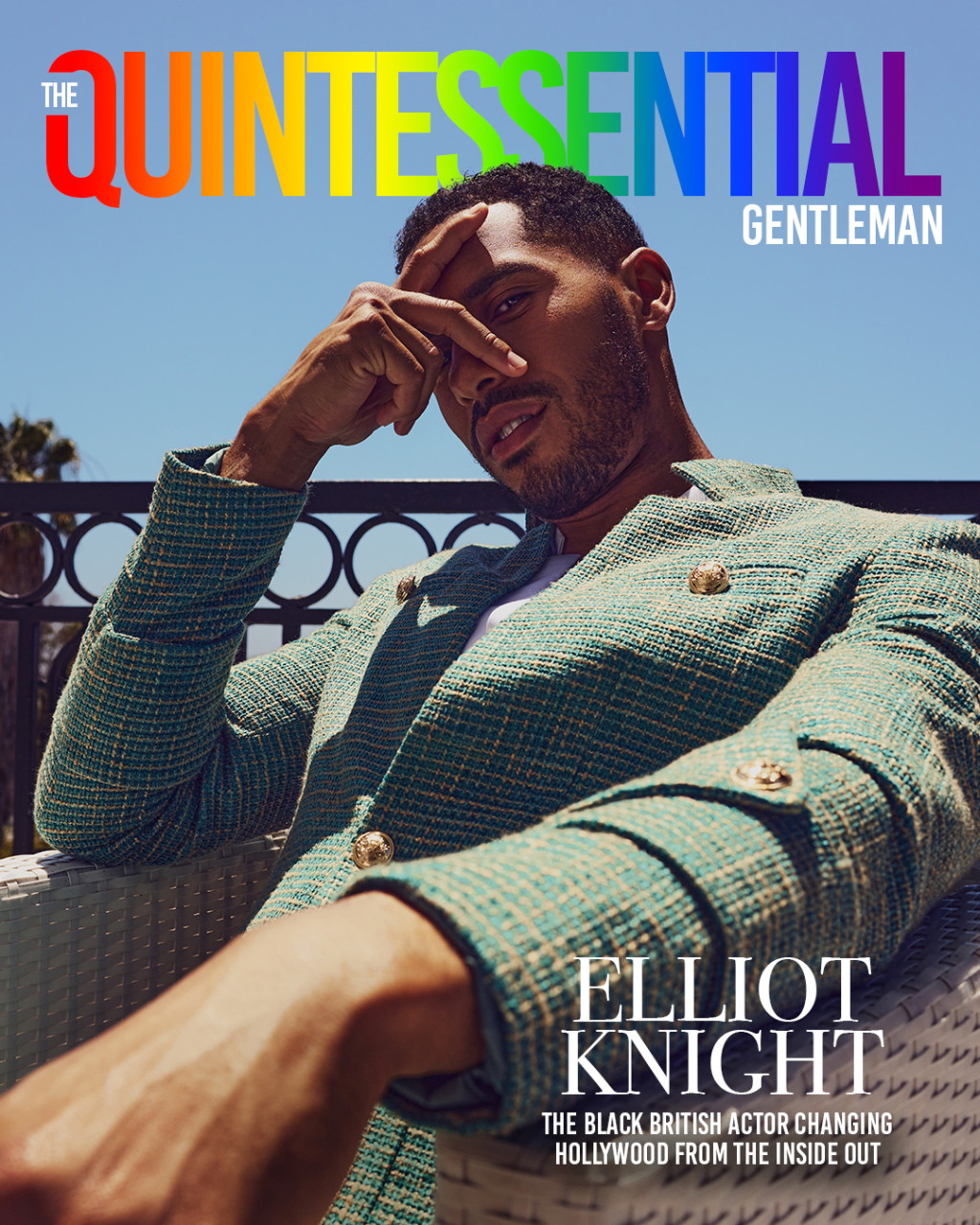
QG: What does success look like for you?
Elliot: At this point in my career and in my life, success for me looks like happiness. It looks like calm, peace, acceptance, connection. It looks like very little of what Hollywood looks like from the outside. There’s so much in the optics of this job and this life.
Success for me is not about how much I’m working, but what I get to work on—what stories I get to tell. It’s not about how many people know my name, but how connected I feel to my own. It’s not about how much money I have, but how much safety and security I’ve developed access to in myself.
A lot of people I know and love—who are on posters, in movies, with money and fame—those aren’t the things that make them happy. They’re amazing luxuries, but they can also be the root of discontent. I’m grateful I’ve learned that soon enough. Those things aren’t the goal. They’re potential gifts along the way. The goal is a lot more personal and grounded. And I’m so happy I know that.
Check out the full interview.
Editor-in-Chief/Art Director: Eric Keith
Photographer: Antar H
Stylist: Ron Jeffries
Groomer: Andrea Pezzillo
Videographer: Leef Parks


